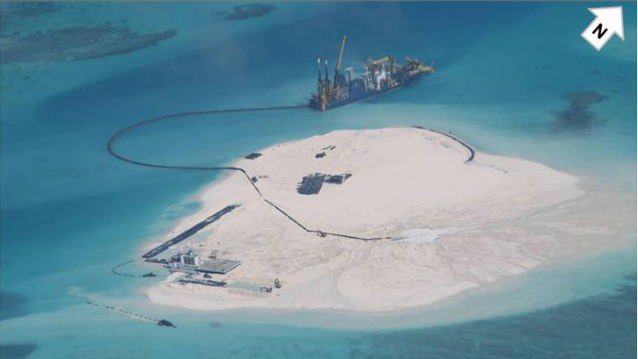China's artificial islands in the South China Sea can 'make it impossible' to settle the Philippines' historic case against the Asian giant, a US-based analyst says

JEOPARDIZING CASE? The Philippines fears China is turning Mabini Reef in the West Philippine Sea (South China Sea) into an island. This image dated Feb 25, 2014 shows ongoing reclamation activities. Photo courtesy of DFA
The Philippines
should work with Vietnam in “accurately surveying” the Spratly Islands in the
disputed South China Sea before China completes its artificial islands in the
area, an analyst said.
In an interview published by Deutsche Welle
on Friday, September 19, Center for Strategic and International Studies (CSIS)
analyst Gregory Poling explained that these artificial islands can “make it
more difficult, if not impossible” to settle the Philippines' case against
China.
“In the meantime,
the one thing this should get Manila and Hanoi to do is make a concerted effort
to short-circuit China's attempts to hide the real status of features by
accurately surveying them now before further reclamation works make it
impossible to determine their original geography,” Poling said.
The Philippines claims parts of the South China Sea
as the West Philippine Sea . Vietnam
Poling, a Sumitro
Chair for Southeast Asia Studies fellow at the Washington-based CSIS, made his
suggestion as China
continued its reclamation activities in the South China
Sea .
Philippine Defense
Secretary Voltaire Gazmin said he fears China
is building a military base in the West Philippine Sea
through its reclamation activities.
'Changing
facts on the ground'
In fact, on
September 9, the Philippine Navy said it has seen structures
resembling lighthouses on two reefs in the West Philippine
Sea .
On the same day,
the BBC also put the issue in the global spotlight after it published “China's Island
Factory,” a much-shared multimedia report on “new islands” being
made “by the might of the Chinese state.”
Poling said it
“was no accident” that China
chose to build artificial islands on 5 features in the South China Sea, “the
status of which (as islands, rocks, or low-tide elevations) are all part of the
Philippines ' case against China
“It seems Beijing
He added:
“Potential access for small aircraft or patrol vessels might also be a benefit,
but it is too early to say. We should regard the alarm bells from Manila Taiwan
maintains at Itu Aba or the Vietnamese have at Spratly Island
No legal
effects, experts say
Poling, however,
said he doubts if reclamation “could affect the legal status of these
features.”
He explained:
“The vast majority of legal scholars have come to the conclusion that
reclamation cannot change the status of a feature; it can merely create an
'artificial island,' which, under the UN Convention on the Law of the Sea, generates
no entitlements. Of course, if reclamation makes it impossible for any court in
the future to determine the original status of these features, then China
In an interview
with Rappler on June 26, maritime law expert Jay Batongbacal also said China 's reclamation doesn't legally jeopardize
the Philippines
“The merits of
the case were set when we filed the Statement of Notification and Claim. These
activities are taking place after the case has been filed, they cannot affect
the merits of the case as filed. Legally, it doesn't jeopardize it,”
Batongbacal explained. (READ: Q and A: Case vs China 'not
enough,' expert says)
Batongbacal,
director of the University of the Philippines Institute for Maritime Affairs
and Law of the Sea, said what jeopardizes the case is the “practical
implication” involving China
Quoting Major
General Zhang Zhaozhong of the Chinese People's Liberation Army, the New York
Times said the cabbage strategy “entails surrounding a contested area with
so many boats – fishermen, fishing administration ships, marine surveillance
ships, navy warships – that the island is thus wrapped layer by layer like a
cabbage.”
The Philippines has repeatedly protested
China 's reclamation
activities, and has slammed the Asian giant
for its “expansion agenda” in the South China Sea .

No comments:
Post a Comment
Note: Only a member of this blog may post a comment.